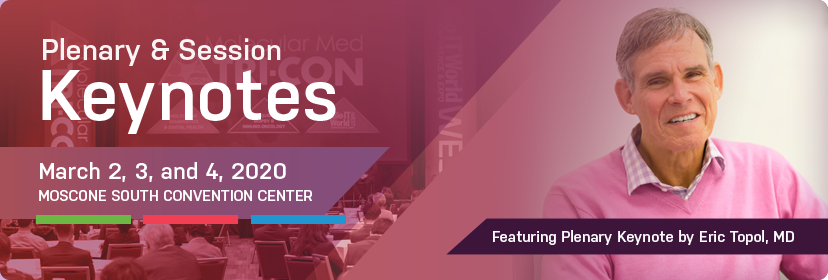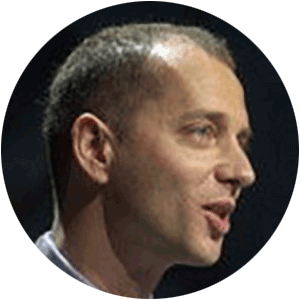
Plenary Keynote Presentation & Keynote Sessions
Plenary Keynote Presentation
Monday, March 2
4:35 – 6:00 pm
4:35 Welcome Remarks
Cindy Crowninshield, RDN, LDN, HHC, Executive Event Director, Cambridge Healthtech Institute
4:45 PLENARY KEYNOTE INTRODUCTION
Thomas Westerling-Bui, PhD, Senior Scientist, Regional Business Development, Aiforia
5:00 PLENARY KEYNOTE PRESENTATION: High-Performance Medicine
 Eric Topol, MD, Founder and Director, Scripps Research Translational Institute (SRTI); Author, Deep Medicine: How Artificial Intelligence Can Make Healthcare Human Again
Eric Topol, MD, Founder and Director, Scripps Research Translational Institute (SRTI); Author, Deep Medicine: How Artificial Intelligence Can Make Healthcare Human Again
The use of artificial intelligence, and the deep-learning subtype, in particular, has been enabled by the use of labeled big data, along with markedly enhanced computing power and cloud storage, across all sectors. In medicine, this is beginning to have an impact at three levels: for clinicians, predominantly via rapid, accurate image interpretation; for health systems, by improving workflow and the potential for reducing medical errors; and for patients, by enabling them to process their own data to promote health. The current limitations, including bias, privacy and security, and lack of transparency, along with the future directions of these applications will be discussed in this article. Over time, marked improvements in accuracy, productivity, and workflow will likely be actualized, but whether that will be used to improve the patient–doctor relationship or facilitate its erosion remains to be seen.
6:00 Grand Opening Reception in the Exhibit Hall with Poster Viewing, Speed Networking, and Book Signing*
*Book Signing with Eric Topol, Author, Deep Medicine: How Artificial Intelligence Can Make Healthcare Human Again. Book will be available for purchase onsite.
Keynote Session for Precision Health & Bio-IT World West
Tuesday, March 3
3:15 – 4:50 pm
3:15 Organizer’s Remarks
Christina Lingham, Executive Director, Conferences and Fellow, Cambridge Healthtech Institute
3:20 Keynote Introduction
 Allison Mallory, PhD, Director, R&D Molecular Biology, Stilla Technologies
Allison Mallory, PhD, Director, R&D Molecular Biology, Stilla Technologies
3:35 What Does the New Era of Genomic Medicine Look Like? Effects on Patient Care, Therapeutics, and Diagnostics
20 years after the completion of the first draft of the Human Genome Project, there is compelling evidence of genomics delivering the rich promise of precision medicine. There have been major advances in the throughput and affordability of genome sequencing, enhanced tools for genome analysis and interpretation, new paradigms for therapeutics and strong signs of clinical benefit using genome editing. But major challenges remain. In this special plenary roundtable, three established pioneers of genomic medicine – David Haussler, Stephen Kingsmore, and Liz Worthey – offer their insights on the extraordinary advances in genomic medicine over the past 1-2 decades and share their hopes and concerns for the future of our field.
Moderator:
 Kevin Davies, PhD, Executive Editor, The CRISPR Journal, Mary Ann Liebert, Inc.
Kevin Davies, PhD, Executive Editor, The CRISPR Journal, Mary Ann Liebert, Inc.
Panelists:
 Stephen Kingsmore, MD, DSc, President/CEO, Rady Children’s Institute for Genomic Medicine
Stephen Kingsmore, MD, DSc, President/CEO, Rady Children’s Institute for Genomic Medicine
 David Haussler, PhD, Investigator, Howard Hughes Medical Institute; Distinguished Professor, Biomolecular Engineering, University of California, Santa Cruz; Scientific Director, UC Santa Cruz Genomics Institute; Scientific Co-Director, California Institute for Quantitative Biosciences (QB3)
David Haussler, PhD, Investigator, Howard Hughes Medical Institute; Distinguished Professor, Biomolecular Engineering, University of California, Santa Cruz; Scientific Director, UC Santa Cruz Genomics Institute; Scientific Co-Director, California Institute for Quantitative Biosciences (QB3)
 Elizabeth Worthey, PhD, Director, Genomic Medicine, University of Alabama, Birmingham School of Medicine
Elizabeth Worthey, PhD, Director, Genomic Medicine, University of Alabama, Birmingham School of Medicine
4:50 Spring Fling Celebration in the Exhibit Hall with Poster Viewing, Speed Networking, and Meetup Group
Keynote Sessions for Digital Health
Monday, March 2
11:45 am – 2:05 pm
DIGITAL HEALTH AT “BIG TECH”
11:45 Organizer’s Opening Remarks
Julia Boguslavsky, Executive Director, Conferences, Cambridge Healthtech Institute
11:50 Chairperson’s Remarks
Thomas Kluz, MS, General Partner, dRx Capital; Head, Healthcare Investing, Qualcomm Ventures
11:55 How Is Wearable-Driven Digital Health Shaping Non-Critical Care?
 Ravi Kuppuraj, PhD, CEO, Digital Innovator, Connected Sensing, Philips
Ravi Kuppuraj, PhD, CEO, Digital Innovator, Connected Sensing, Philips
Consumer wearable devices have already begun to reshape our general experience by putting people in the driver seat and back in charge of their healthcare – and now the healthcare industry has not only begun to see the same potential with clinical wearables, but they are becoming more widely adopted and sought after to address real concerns, like providing increased mobility for patients and decreasing costs for healthcare systems in non-critical care settings.
12:15 pm AI and Its Disruptive Implications for Healthcare
 Chris Gough, General Manager, Health & Life Sciences, Intel Corporation
Chris Gough, General Manager, Health & Life Sciences, Intel Corporation
In this talk, we will explore the disruptive potential of AI for the healthcare industry. This will include market insights, real-world examples of deployments and use cases in healthcare from around the world, and practical guidance for how to prepare your organization to take advantage of these capabilities.
12:35 Forging New Paths for the Digital Revolution in Healthcare
 Charles Mathews, Principal, ClearView Healthcare Partners
Charles Mathews, Principal, ClearView Healthcare Partners
Digital health technology is not only fostering the development and deployment of novel tools that provide innovative clinical information and interventions but it is also raising questions about commercialization, reimbursement, and value creation. In this session, we will discuss the unique ways in which digital health can be leveraged (e.g., prevention, disease management, therapeutic, etc.) and weigh the trade-offs between business models (e.g., payer reimbursed, B2B, etc.). We will also provide insights into strategies that harness the unique nature of digital tools and create a virtuous cycle that fosters innovation.
12:55 PANEL DISCUSSION: How Is “Big Tech” Implementing Digital Health?
Moderator:
 Thomas Kluz, MS, General Partner, dRx Capital; Head, Healthcare Investing, Qualcomm Ventures
Thomas Kluz, MS, General Partner, dRx Capital; Head, Healthcare Investing, Qualcomm Ventures
Panelists:
 Chris Gough, General Manager, Health & Life Sciences, Intel Corporation
Chris Gough, General Manager, Health & Life Sciences, Intel Corporation
 Ravi Kuppuraj, PhD, CEO, Digital Innovator, Connected Sensing, Philips
Ravi Kuppuraj, PhD, CEO, Digital Innovator, Connected Sensing, Philips
Tuesday, March 3
8:00 – 9:40 am
DIGITAL HEALTH AT BIG PHARMA
8:00 Organizer’s Remarks
Julia Boguslavsky, Executive Director, Conferences, Cambridge Healthtech Institute
8:05 Chairperson’s Remarks
Geoff McCleary, Director, Digital Health & Therapeutics, PricewaterhouseCoopers
8:10 Digital Transformation of the Pharmaceutical Industry
 Dirk Schapeler, Vice President, Digital, Bayer LLC
Dirk Schapeler, Vice President, Digital, Bayer LLC
Bayer made digital transformation a top priority a few years ago and thus can look back on a number of successes such as being one of the first companies to launch a cloud-connected drug delivery device, doing the first remote patient monitoring trial and engaging with digital therapeutics. At the same time there were also many lessons learned along the way. Dirk, as one of the drivers of innovation in the digital space at Bayer, will share insights into the digital transformation.
8:30 The Experimental Science behind Empowering Teams
 Matt Lasmanis, Vice President, Technology, GlaxoSmithKline
Matt Lasmanis, Vice President, Technology, GlaxoSmithKline
How do you make large organizations more agile, customer centric and flexible? There are myriad answers, and GSK is using their science focused approach to guide the way. Matt Lasmanis, Vice President of Pharma US Tech, is leading the transformation of the GSK tech culture, empowering his teams to achieve outcomes with clarity over certainty. In the presentation, Matt will discuss: 1) leading experiment-driven data and product-oriented teams and avoiding non-failure driven culture; 2) empowering teams to make decisions closer to the ground; and 3) shifting mindset of teams to be more agile and business-minded.
8:50 Making Personalized Healthcare a Reality: The Potential of Digital Health Technologies
 Mila Malhotra, Digital Health Leader, Ophthalmology, Product Development Medical Affairs Personalized Healthcare and Patient Access, Roche
Mila Malhotra, Digital Health Leader, Ophthalmology, Product Development Medical Affairs Personalized Healthcare and Patient Access, Roche
At Roche, we are working collaboratively to develop Digital Health solutions that aim to improve patient outcomes at each stage of the care continuum. I will discuss how these initiatives can enhance patient care, from early diagnosis to remote monitoring. Digital Health solutions are central to our Personalized Healthcare vision.
9:10 PANEL DISCUSSION: How Is “Big Pharma” Implementing Digital Health?
Moderator:
Geoff McCleary, Director, Digital Health & Therapeutics, PricewaterhouseCoopers
Panelists:
 Matt Lasmanis, Vice President, Technology, GlaxoSmithKline
Matt Lasmanis, Vice President, Technology, GlaxoSmithKline
 Joris van Dam, PhD, Head, Digital Therapeutics, Novartis Institutes for BioMedical Research
Joris van Dam, PhD, Head, Digital Therapeutics, Novartis Institutes for BioMedical Research
 Michael Senical, Director, Strategy and Innovation, Astellas
Michael Senical, Director, Strategy and Innovation, Astellas
 Mila Malhotra, Digital Health Leader, Ophthalmology, Product Development Medical Affairs Personalized Healthcare and Patient Access, Roche
Mila Malhotra, Digital Health Leader, Ophthalmology, Product Development Medical Affairs Personalized Healthcare and Patient Access, Roche
Wednesday, March 4
10:40 am – 1:20 pm
BUILDING DIGITAL HEALTHCARE
10:40 Chairperson’s Remarks
Asif Dhar, Chief Health Informatics Officer, Principal, Deloitte Consulting LLP
10:45 KEYNOTE PRESENTATION: Harmonizing Healthcare Innovation for Better, Faster Transformation
 Leigh Anderson, President of Performance Services, Premier, Inc.
Leigh Anderson, President of Performance Services, Premier, Inc.
Leigh Anderson, Premier’s President of Performance Services, will address the evolving healthcare ecosystem and how technological innovation including the application of artificial intelligence and machine learning must occur using a collaborative framework in order to quickly meet our goals of providing more coordinated, patient centric and high-quality care.
11:05 Smart Health Communities
 Asif Dhar, Chief Health Informatics Officer, Principal, Deloitte Consulting LLP
Asif Dhar, Chief Health Informatics Officer, Principal, Deloitte Consulting LLP
This presentation will cover how digital disruptions are going to completely change the way we live and empower communities to battle disease and create abundant wellness.
11:35 PANEL DISCUSSION: Building Digital Healthcare
Moderator:
 Asif Dhar, Chief Health Informatics Officer, Principal, Deloitte Consulting LLP
Asif Dhar, Chief Health Informatics Officer, Principal, Deloitte Consulting LLP
Panelists:
 Leigh Anderson, President of Performance Services, Premier, Inc.
Leigh Anderson, President of Performance Services, Premier, Inc.
 John Mattison, MD, Chief Medical Information Officer, Emeritus, Kaiser Permanente
John Mattison, MD, Chief Medical Information Officer, Emeritus, Kaiser Permanente
 Claus Jensen, PhD, Chief Digital Officer and Head of Technology, Memorial Sloan Kettering Cancer Center
Claus Jensen, PhD, Chief Digital Officer and Head of Technology, Memorial Sloan Kettering Cancer Center
Keynote Sessions for Bio-IT World Conference & Expo WEST
Monday, March 2
11:45 am – 2:05 pm
11:45 Organizer’s Opening Remarks
Cindy Crowninshield, RDN, LDN, HHC, Executive Event Director, Cambridge Healthtech Institute
11:50 Chairperson’s Remarks
 Allison Proffitt, Editorial Director, Bio-IT World
Allison Proffitt, Editorial Director, Bio-IT World
11:55 Keynote Introduction
Ashoka Rajendra, Head, Product, Registry, Inventory, Benchling
12:10 pm KEYNOTE PRESENTATION: The AI Bubble and the Emerging Thinking Economy
 Pietro Michelucci, PhD, Director, Human Computation Institute
Pietro Michelucci, PhD, Director, Human Computation Institute
This presentation presents a realistic assessment of the “AI bubble” – where there is value, where there is hype, and how human-in-the-loop computing gives us futuristic AI capabilities today that co-evolve with AI technology and even help improve AI.
12:40 PANEL DISCUSSION: Data Quality in Human Computation Systems
Is today’s artificial intelligence fervor based on hype or is it happening? We’ve seen some amazing results from AI-based systems, fueled by increases in processing speed that render traditional applications finally practicable. At the same time, powerful new techniques are emerging including fruitful human/AI partnerships and recent successes based on combining crowdsourcing with machine learning. These new methods dovetail nicely with special challenges posed by precision medicine, often entailing complex interdependencies among data acquisition, analysis, privacy, and ethics. That said, they also introduce a new set of challenges as we navigate issues of transparency, trust, and reliability where automated systems are involved. This panel will discuss recent work in online collective systems that combine human and machine-based information processing in the biomedical space, how these systems could be applied to precision medicine, and how to avoid some of the potential pitfalls associated with these approaches. We also discuss an information processing ecosystem designed to accelerate precision medicine research while mitigating associated complexity and resource needs.
Moderator:
 Allison Proffitt, Editorial Director, Bio-IT World
Allison Proffitt, Editorial Director, Bio-IT World
Panelists:
 Jennifer Couch, PhD, Chief, Structural Biology and Molecular Applications Branch, Division of Cancer Biology and Citizen Science Coordinator, National Cancer Institute
Jennifer Couch, PhD, Chief, Structural Biology and Molecular Applications Branch, Division of Cancer Biology and Citizen Science Coordinator, National Cancer Institute
 Devin
Krotman, Director, IBM Watson AI XPRIZE
Devin
Krotman, Director, IBM Watson AI XPRIZE
 Vani
Mandava, Director, Data Science Outreach, Microsoft Research
Vani
Mandava, Director, Data Science Outreach, Microsoft Research
 Pietro Michelucci, PhD, Director, Human Computation Institute
Pietro Michelucci, PhD, Director, Human Computation Institute
 Ginger Tsueng, PhD, Scientific
Outreach Project Manager, Department of Integrative, Structural and Computational Biology, The Scripps Research Institute
Ginger Tsueng, PhD, Scientific
Outreach Project Manager, Department of Integrative, Structural and Computational Biology, The Scripps Research Institute
Tuesday, March 3
8:00 – 9:40 am
8:00 Organizer’s Remarks
Cindy Crowninshield, RDN, LDN, HHC, Executive Event Director, Cambridge Healthtech Institute
8:05 NEW: Chairperson’s Remarks
Annastasiah Mudiwa Mhaka, PhD, Founder and Principal, Mawambo Lifesciences; Co-Founder, Convenor and Former President, Alliance for AI in Healthcare (AAIH)
8:10 Keynote Sponsor Introduction
 Vasu Rangadass, President, CEO, L7 Informatics, Inc.
Vasu Rangadass, President, CEO, L7 Informatics, Inc.
8:25 KEYNOTE PRESENTATION: AI and Big Data Strategies in Accelerating Clinical Research for Faster Rare Disease Cures
 Harsha Rajasimha, MS, PhD, Founder, Jeeva Informatics Solutions, Inc.; Founder and Chairman, IndoUSrare; Co-Director, Rare Diseases Systems Biology Initiative, George Mason University
Harsha Rajasimha, MS, PhD, Founder, Jeeva Informatics Solutions, Inc.; Founder and Chairman, IndoUSrare; Co-Director, Rare Diseases Systems Biology Initiative, George Mason University
After losing a child to a rare congenital disease, Dr. Rajasimha became determined to apply his clinical genomics data research experience to develop solutions to help accelerate clinical research leading to faster cures for rare disease. Dr. Rajasimha will discuss his efforts in fostering collaborative bridges between patient advocacy groups and researchers in the USA and their counterparts in India to help accelerate clinical research, trials, and therapy access across borders. The talk will include recent global initiatives to accelerate screening, diagnosis, and treatments of rare and undiagnosed diseases. He will also share work on the development of an AI-driven digital health platform to improve clinical trial operational efficiencies while significantly reducing costs and travel burden on patients.
8:55 PANEL DISCUSSION: Applications of AI Technologies in Pharmaceuticals: Facilitating Development of Therapeutics in Treating Rare Diseases
The complex research framework involving industry, academia, and government to discover and develop new therapeutic products makes drug discovery a laborious process. With rapid strides that life sciences companies are making in the fields of gene and cell therapies, -omics technologies, and smart molecule approaches, an urgent need exists for cost-effective, time-effective, and advanced technologies to analyze large databases of information to help develop novel therapies. Organizations are recognizing the value of AI-based platforms and tools to leverage data to find hidden drug-disease correlations. Also, structured and unstructured data can be derived from multiple sources as never before. This panel brings senior level experts in pharma, AI-based technology, and government to discuss the role of AI platforms and tools to establish a robust pipeline as part of drug discovery portfolio and address new therapeutic areas, including rare diseases.
NEW: Moderator:
 Annastasiah Mudiwa Mhaka, PhD, Founder and Principal, Mawambo Lifesciences; Co-Founder, Convenor and Former President, Alliance for AI in Healthcare (AAIH)
Annastasiah Mudiwa Mhaka, PhD, Founder and Principal, Mawambo Lifesciences; Co-Founder, Convenor and Former President, Alliance for AI in Healthcare (AAIH)
Panelists:
 Thomas Defay, Senior Director, R&D Strategy and Alliances, SPMD, Strategy, Program Management and Data Sciences, Alexion
Thomas Defay, Senior Director, R&D Strategy and Alliances, SPMD, Strategy, Program Management and Data Sciences, Alexion
 Harsha Rajasimha, MS, PhD, Founder, Jeeva Informatics Solutions, Inc.; Founder and Chairman, IndoUSrare; Co-Director, Rare Diseases Systems Biology Initiative, George Mason University
Harsha Rajasimha, MS, PhD, Founder, Jeeva Informatics Solutions, Inc.; Founder and Chairman, IndoUSrare; Co-Director, Rare Diseases Systems Biology Initiative, George Mason University
 Vasu Rangadass, President, CEO, L7 Informatics, Inc.
Vasu Rangadass, President, CEO, L7 Informatics, Inc.
Wednesday, March 4
8:00 – 9:40 am
8:00 Organizer’s Remarks
Edel O’Regan, PhD, Vice President, Production, Cambridge Healthtech Institute
8:05 Chairperson’s Remarks
Joseph Ferrara, CEO, Boston Healthcare
8:10 Keynote Introduction
Fred Lee, MD, MPH, Head of Health Care, Life Sciences Business Development, AWS Data Exchange, AWS
8:25 KEYNOTE PRESENTATION: The Value and Application of Informatics in Cancer Care Delivery
 Debra Patt, MD, Vice President, Public Policy & Academic Affairs, Medical Oncologist, Texas Oncology Cancer Center & Editor in Chief, Journal of Clinical Oncology-Clinical Cancer Informatic
Debra Patt, MD, Vice President, Public Policy & Academic Affairs, Medical Oncologist, Texas Oncology Cancer Center & Editor in Chief, Journal of Clinical Oncology-Clinical Cancer Informatic
Dr. Patt will discuss how Clinical Informatics can be used in practice to improve the quality of cancer care. Specifically, how clinical decision support systems embedded in health records can facilitate concordance with evidence-based treatment. She will discuss how predictive analytics can be used in a practice to understand patient risk. She will discuss how the growth of mHealth applications can bridge the gap between patients and providers.
8:55 PANEL DISCUSSION: Pragmatic Use of Informatics in Cancer Care Delivery and Cancer Research: Big Data and AI Take on Cancer
In oncology today, increasingly large amounts of heterogeneous data, created by multiple medical disciplines, is being collected and aggregated and technologies such as machine learning and deep learning are being tested to create knowledge and insight to improve cancer care and inform oncology research and drug discovery. This panel will bring together many of the stakeholders to discuss the challenges and opportunities in using big data and informatics tools to improve cancer care delivery and cancer research. This panel will include practicing oncologists, oncology researchers, machine learning experts, pharmaceutical and translational researchers, and technology solution providers.
Topics to Include:
- The value and application of informatics in research and in practical cancer care delivery
- Predictive analytics to improve risk stratification in oncology
- State of comprehensive genomic profiling in oncology
- Aggregation and analysis of genomic and patient reported outcome data
- Aggregation and analysis of patient records, population level analysis and building cohorts of patients
- Translational research and informatics tools in support of clinical trials
- Big data from recurrence and resistance, informing identification of new targets and driving new drug discovery campaigns
- Transforming cancer, diagnosis, drug discovery and patient care with big data and AI
- Reproducible research, data conformance and semantic modeling
Moderator:
 Joseph Ferrara, CEO, Boston Healthcare
Joseph Ferrara, CEO, Boston Healthcare
Panelists:
 Mark Hulse, Chief Digital Officer, City of Hope
Mark Hulse, Chief Digital Officer, City of Hope
 Debra Patt, MD, Vice President, Public Policy & Academic Affairs, Medical Oncologist, Texas Oncology Cancer Center & Editor in Chief, Journal of Clinical Oncology-Clinical Cancer Informatics
Debra Patt, MD, Vice President, Public Policy & Academic Affairs, Medical Oncologist, Texas Oncology Cancer Center & Editor in Chief, Journal of Clinical Oncology-Clinical Cancer Informatics
 Nicholas Schork, PhD, Deputy Director of Quantitative Sciences, Distinguished Professor of Quantitative Medicine, The Translational Genomics Research Institute (TGen)
Nicholas Schork, PhD, Deputy Director of Quantitative Sciences, Distinguished Professor of Quantitative Medicine, The Translational Genomics Research Institute (TGen)
 Kristin Beaumont, PhD, Assistant Professor, Assistant Director of Single Cell Genomics Technology Development Icahn Institute, Dept. of Genetics & Genomic Sciences, Icahn School
Kristin Beaumont, PhD, Assistant Professor, Assistant Director of Single Cell Genomics Technology Development Icahn Institute, Dept. of Genetics & Genomic Sciences, Icahn School
 Ajay Shah, PhD, Executive Director & Head of IT for Translational Medicine, Bristol-Myers Squibb
Ajay Shah, PhD, Executive Director & Head of IT for Translational Medicine, Bristol-Myers Squibb
 Paul Rejto, PhD, Vice President, Head of Translational Research, Pfizer Oncology R&D
Paul Rejto, PhD, Vice President, Head of Translational Research, Pfizer Oncology R&D